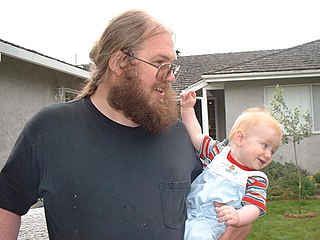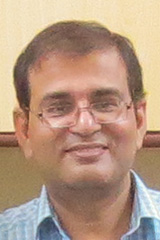Related Research Articles

David A. Forsyth is a South-African-born American computer scientist and the Fulton Watson Copp Chair in Computer Science the University of Illinois at Urbana–Champaign.

Takeo Kanade is a Japanese computer scientist and one of the world's foremost researchers in computer vision. He is U.A. and Helen Whitaker Professor at Carnegie Mellon School of Computer Science. He has approximately 300 peer-reviewed academic publications and holds around 20 patents.
The International Conference on Computer Vision (ICCV) is a research conference sponsored by the Institute of Electrical and Electronics Engineers (IEEE) held every other year. It is considered to be one of the top conferences in computer vision, alongside CVPR and ECCV, and it is held on years in which ECCV is not.

Yann André Le Cun is a French-American computer scientist working primarily in the fields of machine learning, computer vision, mobile robotics and computational neuroscience. He is the Silver Professor of the Courant Institute of Mathematical Sciences at New York University and Vice President, Chief AI Scientist at Meta.

Jitendra Malik is an Indian-American academic who is the Arthur J. Chick Professor of Electrical Engineering and Computer Sciences at the University of California, Berkeley. He is known for his research in computer vision.
The European Conference on Computer Vision (ECCV) is a biennial research conference with the proceedings published by Springer Science+Business Media. Similar to ICCV in scope and quality, it is held those years which ICCV is not. It is considered to be one of the top conferences in computer vision, alongside CVPR and ICCV, with an 'A' rating from the Australian Ranking of ICT Conferences and an 'A1' rating from the Brazilian ministry of education. The acceptance rate for ECCV 2010 was 24.4% for posters and 3.3% for oral presentations.
Bir Bhanu is the Marlan and Rosemary Bourns Endowed University of California Presidential Chair in Engineering, the Distinguished Professor of Electrical and Computer Engineering, and Cooperative Professor of Computer Science and Engineering, Mechanical Engineering and Bioengineering, at the Marlan and Rosemary Bourns College of Engineering at the University of California, Riverside (UCR). He is the first Founding Faculty of the Marlan and Rosemary Bourns College of Engineering at UCR and served as the Founding Chair of Electrical Engineering from 1/1991 to 6/1994 and the Founding Director of the Center for Research in Intelligent Systems (CRIS) from 4/1998 to 6/2019. He has been the director of Visualization and Intelligent Systems Laboratory (VISLab) at UCR since 1991. He was the Interim Chair of the Department of Bioengineering at UCR from 7/2014 to 6/2016. Additionally, he has been the Director of the NSF Integrative Graduate Education, Research and Training (IGERT) program in Video Bioinformatics at UC Riverside. Dr. Bhanu has been the principal investigator of various programs for NSF, DARPA, NASA, AFOSR, ONR, ARO and other agencies and industries in the areas of object/target recognition, learning and vision, image/video understanding, image/video databases with applications in security, defense, intelligence, biological and medical imaging and analysis, biometrics, autonomous navigation and industrial machine vision.

Fei-Fei Li is a Chinese-American computer scientist known for establishing ImageNet, the dataset that enabled rapid advances in computer vision in the 2010s. She is the Sequoia Capital professor of computer science at Stanford University and former board director at Twitter. Li is a co-director of the Stanford Institute for Human-Centered Artificial Intelligence and a co-director of the Stanford Vision and Learning Lab. She served as the director of the Stanford Artificial Intelligence Laboratory from 2013 to 2018.

Theodosios Pavlidis is a computer scientist and Distinguished Professor Emeritus of Computer Science at the State University of New York, Stony Brook.

The Task Force on Rebooting Computing (TFRC), housed within IEEE Computer Society, is the new home for the IEEE Rebooting Computing Initiative. Founded in 2013 by the IEEE Future Directions Committee, Rebooting Computing has provided an international, interdisciplinary environment where experts from a wide variety of computer-related fields can come together to explore novel approaches to future computing. IEEE Rebooting Computing began as a global initiative launched by IEEE that proposes to rethink the concept of computing through a holistic look at all aspects of computing, from the device itself to the user interface. As part of its work, IEEE Rebooting Computing provides access to various resources like conferences and educational events, feature and scholarly articles, reports, and videos.

Jagdishkumar Keshoram Aggarwal is an American computer scientist, who is currently retired and is Cullen Trust Endowed Emeritus Professor of the Department of Electrical and Computer Engineering at the Cockrell School of Engineering, University of Texas at Austin. He is known for his contributions in the fields of computer vision, pattern recognition and image processing focusing on human motion and activities. He served in various positions in the Department of Electrical and Computer of the University of Texas at Austin and other institutions.

Subhasis Chaudhuri is an Indian electrical engineer, former director at the Indian Institute of Technology, Bombay and currently Chairman of the Board of Directors of BSE Limited. He is a former K. N. Bajaj Chair Professor of the Department of Electrical Engineering of IIT Bombay. He is known for his pioneering studies on computer vision and is an elected fellow of all the three major Indian science academies viz. the National Academy of Sciences, India, Indian Academy of Sciences, and Indian National Science Academy. He is also a fellow of Institute of Electrical and Electronics Engineers, and the Indian National Academy of Engineering. The Council of Scientific and Industrial Research, the apex agency of the Government of India for scientific research, awarded him the Shanti Swarup Bhatnagar Prize for Science and Technology, one of the highest Indian science awards, in 2004 for his contributions to Engineering Sciences.

René Vidal is a Chilean electrical engineer and computer scientist who is known for his research in machine learning, computer vision, medical image computing, robotics, and control theory. He is the Herschel L. Seder Professor of the Johns Hopkins Department of Biomedical Engineering, and the founding director of the Mathematical Institute for Data Science (MINDS).

Gregory D. Hager is the Mandell Bellmore Professor of Computer Science and founding director of the Johns Hopkins Malone Center for Engineering in Healthcare at Johns Hopkins University.
Jiebo Luo is a Chinese-American computer scientist, the Albert Arendt Hopeman Professor of Engineering and professor of computer science at the University of Rochester. He is interested in artificial intelligence, data science and computer vision.

Michael J. Black is an American-German computer scientist currently working in Tübingen, Germany. He is a founding director at the Max Planck Institute for Intelligent Systems where he leads the Perceiving Systems Department in research focused on computer vision, machine learning, and computer graphics. He is also an Honorary Professor at the University of Tübingen.
Song-Chun Zhu is a Chinese computer scientist and applied mathematician known for his work in computer vision, cognitive artificial intelligence and robotics. Zhu currently works at Peking University and was previously a professor in the Departments of Statistics and Computer Science at the University of California, Los Angeles. Zhu also previously served as Director of the UCLA Center for Vision, Cognition, Learning and Autonomy (VCLA).
Jiaya Jia is a Chair Professor of the Department of Computer Science and Engineering at The Hong Kong University of Science and Technology (HKUST). He is an IEEE Fellow, the associate editor-in-chief of one of IEEE’s flagship and premier journals- Transactions on Pattern Analysis and Machine Intelligence (TPAMI), as well as on the editorial board of International Journal of Computer Vision (IJCV).
Gérard G. Medioni is a computer scientist, author, academic and inventor. He is a vice president and distinguished scientist at Amazon and serves as emeritus professor of Computer Science at the University of Southern California.
Jiří Matas is a Czech scientist specialising in pattern recognition. His areas of research include visual tracking, object recognition, image matching and retrieval, sequential pattern recognition, and RANSAC-type optimization methods.
References
- ↑ "Computer Vision Foundation open access".
- ↑ "Welcome to CVPR 2020!" (PDF). cvpr2020.thecvf.com. 2020. Retrieved 2020-08-08.
- ↑ "Conference-Acceptance-Rate". August 7, 2020 – via GitHub.
- ↑ "Welcome" (PDF). cvpr2019.thecvf.com. Retrieved 2020-08-08.
- ↑ "CVPR 2020 Proceeding as Planned; Record 1470 Papers Accepted". Synced. March 2, 2020.
- ↑ "Conference History". IEEE Computer Society Technical Committee on Pattern Analysis and Machine Intelligence. Archived from the original on 2022-09-20. Retrieved 2020-07-24.
- ↑ "Area Chair Guidelines - CVPR 2012". tab.computer.org.
- ↑ "Conferences – The Computer Vision Foundation". www.thecvf.com.
- ↑ "CVPR Best Paper Award". IEEE Computer Society website. IEEE . Retrieved 3 April 2019.
- ↑ "Computer Vision Awards – The Computer Vision Foundation". www.thecvf.com.
- ↑ "PAMI Young Research Award". IEEE Computer Society website. IEEE . Retrieved 22 January 2014.
- ↑ "Inaugural image and vision computing outstanding young researcher award winner announced". Image and Vision Computing. 30 (9). Elsevier: 603. 2012. doi:10.1016/j.imavis.2012.07.008. ISSN 0262-8856.
- ↑ "Awards" . Retrieved 22 January 2014.
- ↑ "Computer Vision Awards: PAMI Thomas S. Huang Memorial Prize – The Computer Vision Foundation". www.thecvf.com.